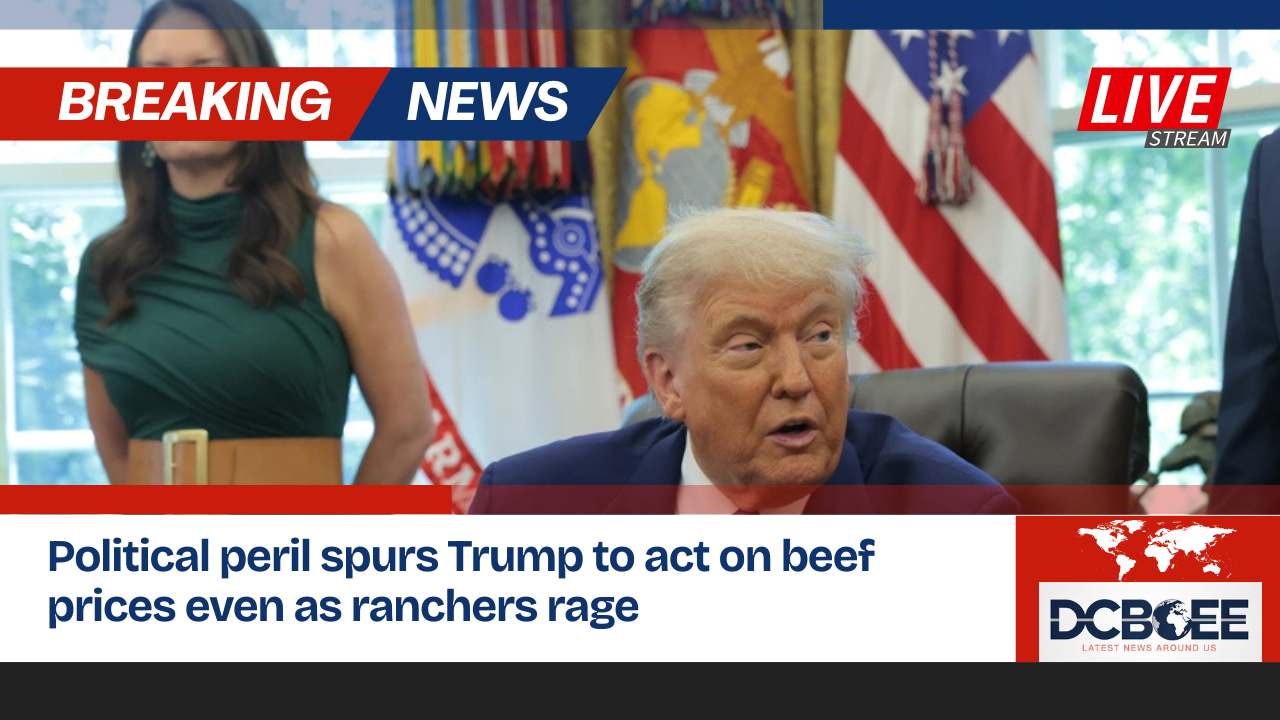
Political peril spurs Trump to act on beef prices even as ranchers rage
The Trump administration knows that beef is a political weakness that might happen at any time.
In just the last month, President Donald Trump has repeatedly expressed frustration with the high prices U.S. consumers are seeing in grocery stores, promising “a deal” to “bring the price down.”
The plan to buy 80,000 metric tons of beef from Argentina, which is four times the normal amount, is a short-term solution to boost supply. This has made farm-state Republicans and agriculture industry groups very angry because they feel like they have been hurt by several Trump administration policies in the past few months.
But Americans’ worries about high costs helped Trump win the election. He repeatedly talked about this on the campaign trail, promising that food prices would go down if he became president again. Trump and his closest officials are working hard to achieve their campaign promise after ten months. They think that in the short term, it’s worth upsetting ranchers, a loyal GOP group that profits from high meat prices, if they can lower costs for consumers.
“It’s like eggs, part two,” said someone close to the Trump administration who asked to remain anonymous so they could talk about private conversations. “All of this started with worries about prices for consumers.”
The Federal Reserve Bank of St. Louis says that the average price for a pound of ground beef is $6.32. Since Trump became president, prices have gone up by nearly 14%. Meat is still one of the biggest causes of total inflation in grocery shops, according to new federal data on food prices that came out on Friday.
Trump’s anger was clear last week when he used Truth Social to tell cow ranchers to “get their prices down” and said that his tariffs on Brazil, another major beef exporter, were good for the U.S. cattle market.
Trump remarked on Saturday while on Air Force One, “The ranchers have made some money for the first time in years.” “The prices of beef have gone up a little bit, so we’ll have to decide what to do. The ranchers are very happy because they have been suffering for a long time.”
Trump’s aides say that the president is keen on helping both customers and the country’s ranchers, even though the White House’s efforts to decrease production costs across the board in the long term haven’t done much to quiet the outcry.
“The president loves our farmers and also loves American shoppers.” “Because he wants to do right by both, the president wants to bring down the cost of beef right away. We need to increase our supply,” White House press secretary Karoline Leavitt told reporters on Thursday. “He promised to lower costs, and that’s what he is going to do.”
A White House official said that the administration’s intentions to grow the herd of domestic cattle will help the beef business in the long run.
The official, who was given anonymity to talk about internal thoughts, said that Argentina is a natural substitute for Brazilian beef with higher tariffs. They also said that the administration has bigger problems to deal with in Brazil.
“President Trump promised to protect American ranchers and help everyday Americans with their finances,” said Anna Kelly, a White House official. “The Administration is doing both by increasing beef imports from Argentina to lower prices for consumers in the short term and starting a new USDA program that will help ranchers and grow cattle herds to keep prices lower in the long term.”
It’s not certain if Trump will be able to decrease prices in the end, and Republicans say it will punish ranchers without lowering prices for consumers very much. Sen. Deb Fischer (R-Neb.) said in a statement last week, “This isn’t the way to deal with beef prices at the grocery store.”
People are angry about the rise in imports because they are unhappy with the $20 billion (which could double) bailout for Argentina, even if its farmers are hurting the U.S. soybean market. The trade dispute between China and the U.S. has led to China stopping buying American soybeans, which hurts U.S. farmers who are already having a hard time. And for U.S. farmers who are having a hard time with problems in the industry, the president’s promised bailout is running out of time.
Argentina President Javier Milei visited the White House on Oct. 14, where he dined on chargrilled beef filet with Trump. After that meeting, Trump started to talk about the idea of bringing in additional beef from the South American country.
“We’re working on beef, and I think we have a deal on beef that’s going to lower the price,” Trump told reporters this month. “That would be the one product that we would say is a little bit higher than we want it, maybe higher than we want it, and that’s going to be coming down pretty soon, too. We did something, we worked our magic.
The president’s allies said beyond consumer cost worries, the timing of the release isn’t coincidental. Trump and his staff also want to help Milei, who has strong ties to the president and his MAGA movement.
Still, Trump’s declaration about Argentina caught farm-state Republicans off guard. Last week, numerous GOP senators brought their concerns to the president, Agriculture Secretary Brooke Rollins, Treasury Secretary Scott Bessent, and U.S. Trade Representative Jamieson Greer. Those politicians were already getting calls from outraged ranchers and trade groups who were anxious that the deal might hurt their own businesses.
“It’s not only groups that support farmers. Another supporter of the agriculture industry said, “Regular farmers out there are mad, and conservative allies are mad.” “Many rural and fairly conservative farmers are saying, ‘What the hell? … The problem now is that we’re also helping Argentina by importing Argentinian beef instead of American beef, which means that you’re hurting American agriculture twice as much as you’re hurting American interests.” And it’s not clear how long it will take for prices at the grocery store to go down because of the higher supply. Experts say that prices probably won’t change in the near future, even with a lot of new imports, because the beef industry is becoming more consolidated and vertically integrated, and the life cycle of cattle is longer than that of other livestock.
Last week, the government also made a lot of regulatory changes that are good for businesses. Officials say these changes will lower prices in the long run, but experts warn it might take decades to boost the size of the U.S. cow herd supply. People were more upset about the president’s plans to bring in more beef than they were about his plans to help ranchers.
Colin Woodall, CEO of the National Cattlemen’s Beef Association, said in a statement in response to the import plans, “This plan only causes chaos at a very important time of year for American cattle producers and does nothing to lower grocery store prices.” “We ask President Trump and members of Congress to let the market work instead of getting involved in ways that only hurt rural America.”
See Also: Federal lawyers admit errors in officer deployment numbers to Portland ICE building






![My biggest AirPods Pro 3 problem has improved, how about you? [Poll]](https://dcboee.us/wp-content/uploads/2025/11/President-Faces-Impeachment-Nation-Braces-for-Political-Turmoil-67-768x432.png)
